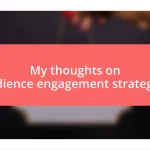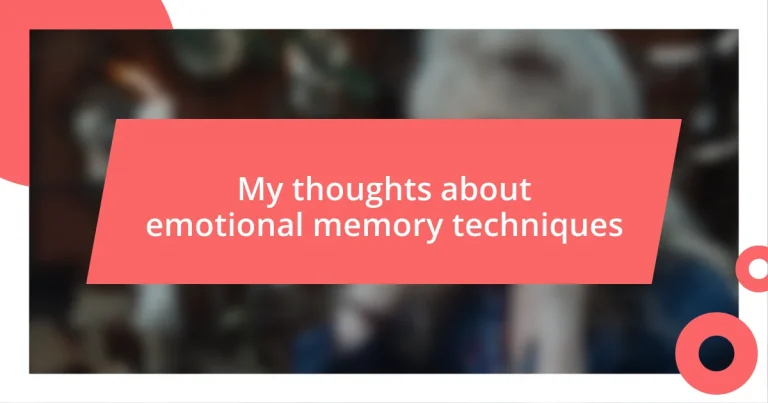Key takeaways:
- Emotional experiences significantly enhance memory recall by creating deep, meaningful connections with information.
- Utilizing storytelling and emotional associations can transform the learning process, making it engaging and effective.
- Incorporating emotions into memory techniques, such as journaling and using sensory cues, improves retention and understanding in both academic and personal contexts.
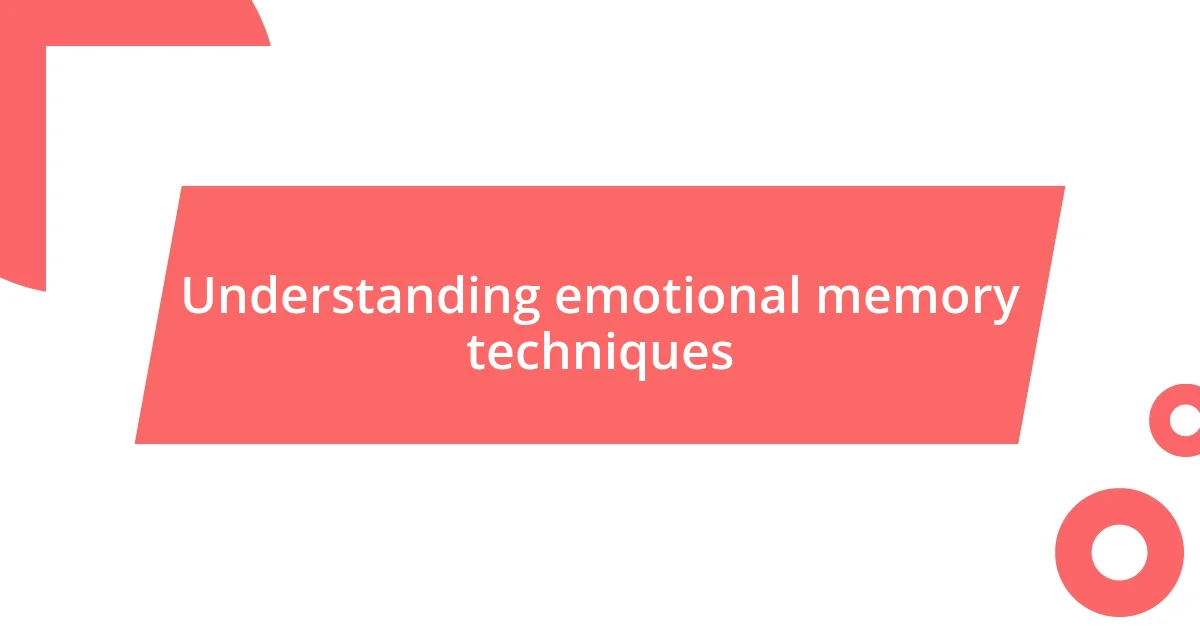
Understanding emotional memory techniques
Emotional memory techniques revolve around the idea that our emotional experiences can significantly enhance how we remember information. I recall a time when I was studying for an important exam; I decided to associate certain facts with vivid images tied to my emotions. It was almost as if the emotions acted as a magnet, pulling those memories from the depths of my mind when I needed them the most.
Have you ever found yourself recalling a song and being instantly transported back to a specific moment? This phenomenon happens because emotions create powerful connections in our brains. I remember the first time I heard a particular song during a significant event; it forever linked that melody to the emotions I felt. Understanding how our emotions intertwine with memory can unlock a wealth of strategies for learning and recalling information more effectively.
The science behind emotional memory techniques is fascinating. It hinges on how our brain processes emotions and memories simultaneously. I often think about how I can leverage this in daily life. When I want to remember something important, I sometimes create a story around it, infusing it with emotions that resonate with me. What if you could do the same? Wouldn’t that make recalling information not just easier, but also more enjoyable?
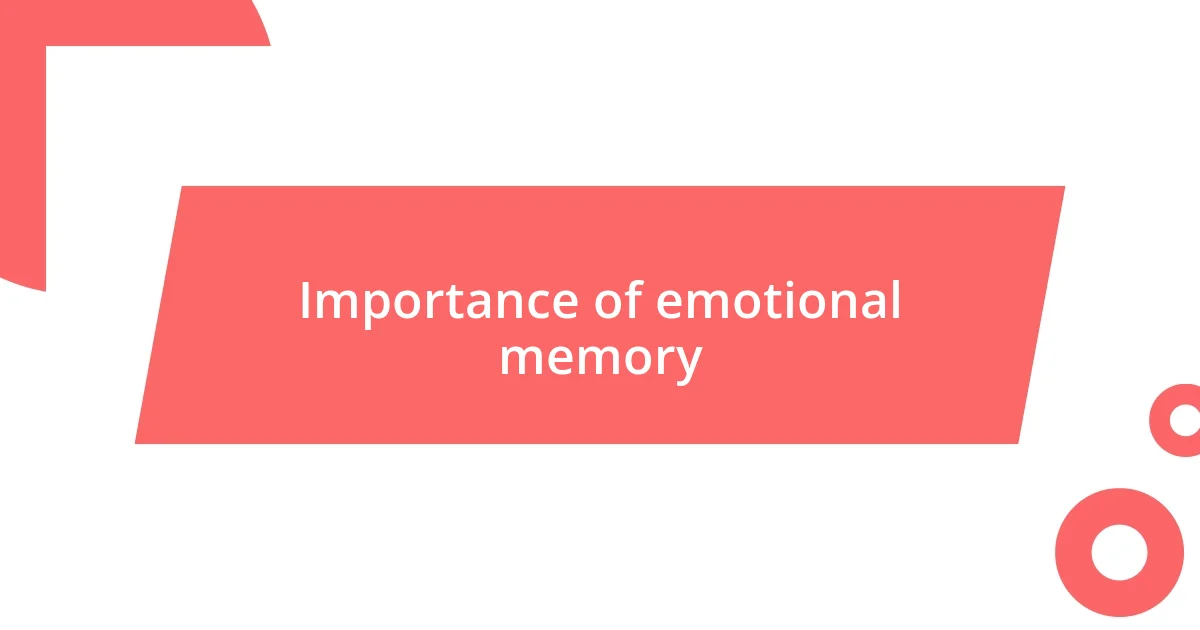
Importance of emotional memory
Emotional memory plays a vital role in our ability to retain and recall information. I’ve noticed how connected my memories from childhood are to strong feelings. For instance, a simple scent can sometimes whisk me back to a warm summer day at my grandmother’s house, evoking both a vivid scene and the feelings I experienced at that moment. This illustrates why emotional memory is so foundational; it layers our experiences with richness and depth.
Research shows that emotions can enhance memory recall by making experiences more memorable. I distinctly remember a group project in college, where we struggled but ultimately connected over shared stress and laughter. Those feelings not only forged a bond among us but also ensured that the project and its lessons stuck with me long after graduation. In my experience, emotional engagement creates a stronger, more lasting imprint in our minds.
Interestingly, emotional memory techniques can be applied not only in academic settings but in daily life and personal growth as well. I’ve seen how journaling about meaningful experiences allows me to tap into my emotions, leading to better understanding and remembrance of those moments. When we harness the power of emotions, we can transform ordinary memories into extraordinary lessons, enriching our understanding and connection to the world around us.
| Aspect | Traditional Memory | Emotional Memory |
|---|---|---|
| Recall | Less effective; often forgets details | Enhanced recall; evokes strong images and feelings |
| Connection | Often superficial | Deep and meaningful connections with experiences |
| Learning | Can be tedious | Engaging and enjoyable; fosters creativity |
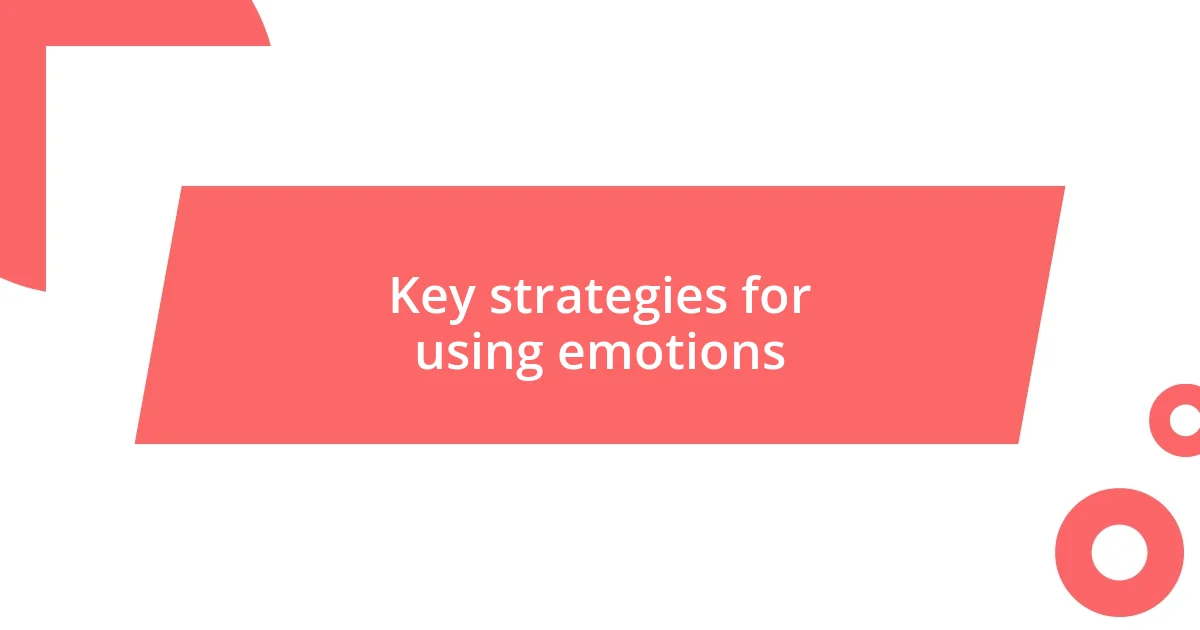
Key strategies for using emotions
Harnessing the power of emotions can amplify your memory techniques in profound ways. When I want to remember complex information, I often connect those facts to personal stories that evoke strong feelings. For example, instead of simply memorizing dates in history, I visualize the emotions of the people who lived through those events, making those dates feel alive and relevant.
Here are some key strategies to help you effectively use emotions in your memory techniques:
- Create powerful associations: Link new information to vivid emotional experiences from your life. This can significantly boost recall.
- Use the “memory palace” technique: Imagine walking through a familiar place and assign emotional memories to different locations. This spatial relationship can trigger the associated emotions and memories simultaneously.
- Visualize emotions: When studying, visualize how an event made you feel, whether it was joy, sadness, or excitement. This technique helps embed the information more deeply.
- Engage multiple senses: Incorporate music, scents, or even tactile objects that resonate with the memories. When I listen to specific songs while studying, it creates a multisensory experience that elevates my emotional connection and recall.
- Reflect and journal: Spend time reflecting on the emotions tied to your experiences. I’ve found that journaling about significant events allows me to revisit those feelings and experiences, reinforcing their impact on my memory.
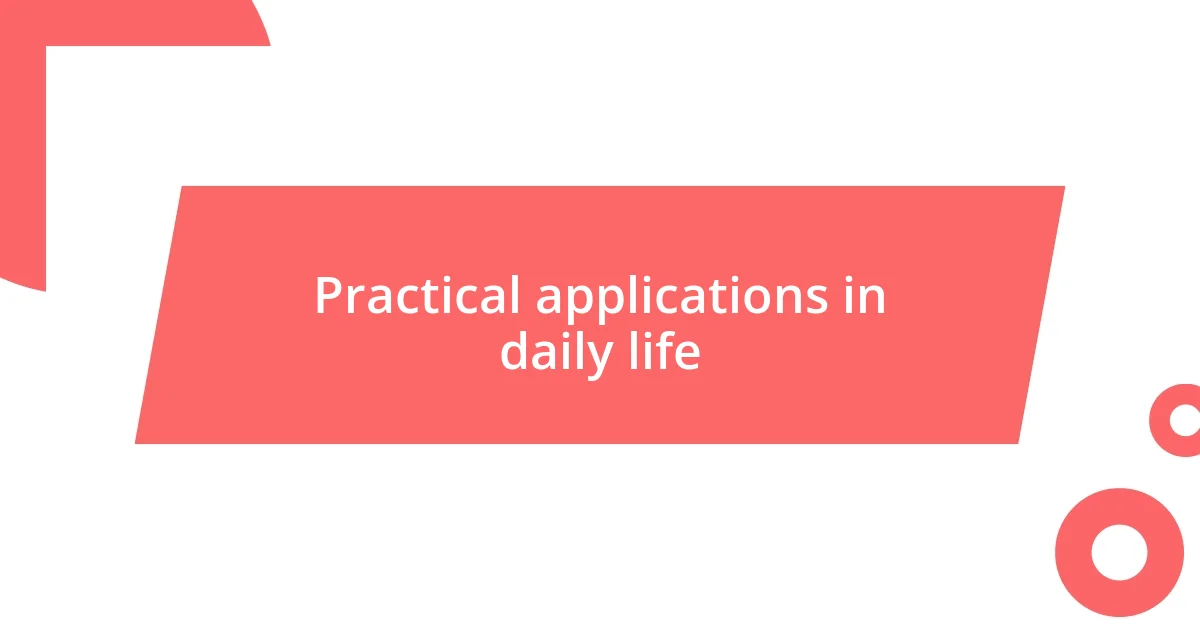
Practical applications in daily life
In my day-to-day life, I’ve realized that emotional memory techniques can significantly improve my interactions with others. For instance, when I approach a friend who’s feeling down, I tap into my own experiences of sadness. This not only helps me empathize but also makes my support feel more genuine, creating a deeper connection that they seem to appreciate. Have you ever noticed how sharing our emotional stories can sometimes lift someone’s spirits?
In the workplace, I often utilize emotional memory strategies during presentations. I’ve found that sharing a personal story related to the topic instantly engages my audience. Just last week, I told a story about overcoming a challenge that resonated with my colleagues; their feedback indicated that it not only made the presentation memorable but also fostered a sense of teamwork. Doesn’t it feel great when you realize that emotions can create bonds in professional settings?
On a more personal note, I use emotional memory techniques in my self-reflection routines. Each evening, I take a moment to think about the highlights and challenges of my day, focusing on how I felt during each moment. This practice helps me crystallize valuable lessons and gives me a clearer picture of what brings me joy or frustration. It’s like having a daily emotional report card that guides my decisions moving forward. Have you ever attempted something similar?
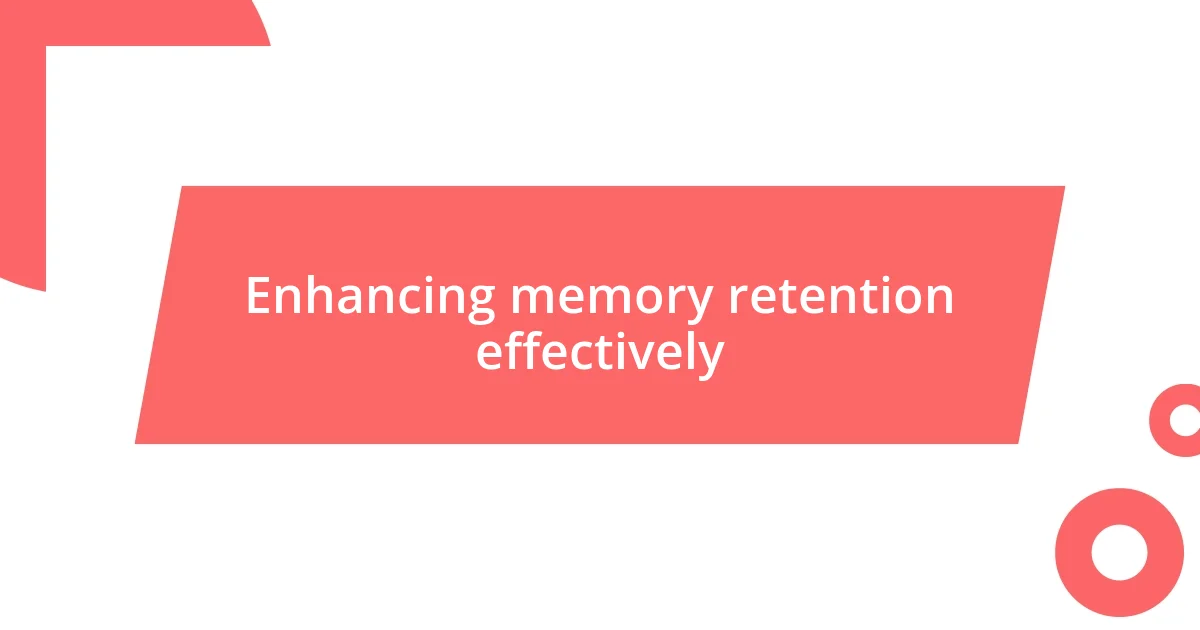
Enhancing memory retention effectively
One of the most impactful ways I’ve found to enhance memory retention is through storytelling. When I incorporate emotions into a narrative—like recalling how I felt during a significant life event—it transforms dry facts into something vivid and meaningful. Have you ever noticed how a good story can cling to your mind long after it’s told? That’s the power of emotional engagement in memory.
I also experiment with creating emotional anchors. For instance, I once had a tough time recalling the periodic table until I associated elements with moments from my life—like linking iron to a childhood incident involving a rusty bike. This connection was so strong that now, whenever I think of iron, I can vividly picture that bike ride. Isn’t it fascinating how such personal ties can make even the most abstract concepts memorable?
Additionally, I enjoy using music as an emotional cue while studying. For example, I’ll play a song that reminds me of a particular time in my life, and while studying, I focus on that emotion. Later, when I hear that song, I’m often transported back to the material I studied during that time, cementing the information in my memory. Have you tried using your favorite tunes to boost your memory? It’s a simple yet effective trick that’s made a real difference for me.
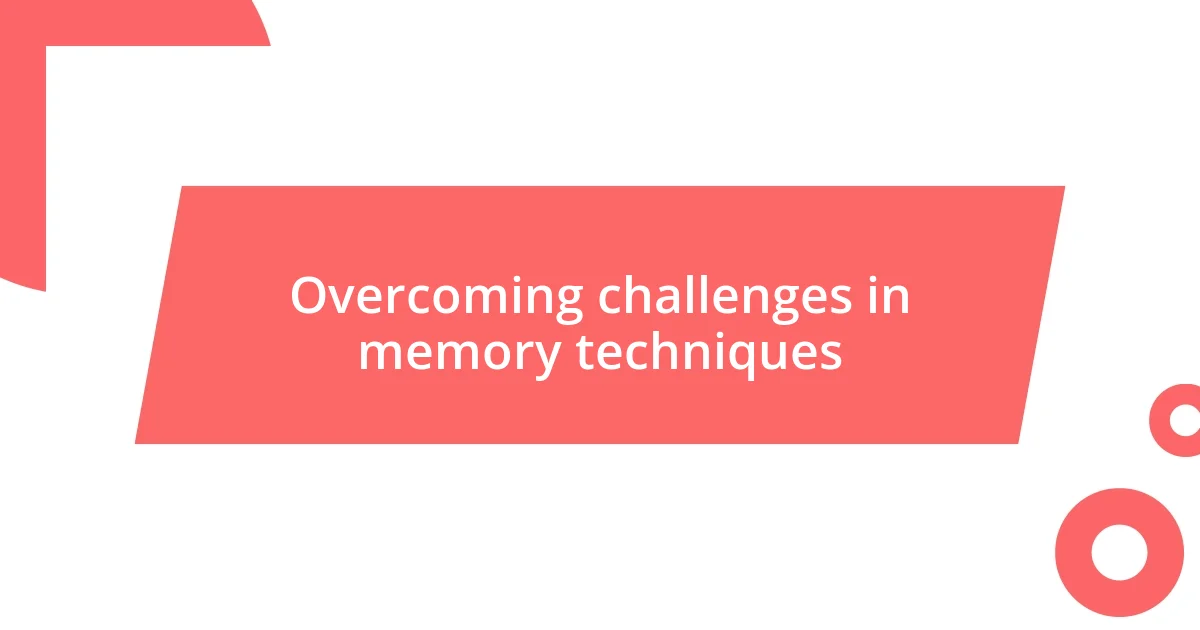
Overcoming challenges in memory techniques
Overcoming challenges in memory techniques often requires some creativity and flexibility. I’ve struggled at times with remembering key details, especially when under pressure. In those moments, I’ve found that simply stepping back and connecting the information to my emotions can really help break through that fog. Have you ever noticed how tapping into your feelings can shift your focus?
One obstacle I faced was dealing with overwhelming information, particularly when studying for exams. I started to compartmentalize my study materials by associating them with different emotional states. This technique not only improved my retention but also made the process more enjoyable. It’s incredible how transforming a mundane task into an emotional journey can lighten the burden of memorization. Have you tried linking your study topics to how you felt during important events?
Additionally, I’ve learned that our emotional state plays a significant role in our ability to recall information. On days when I felt stressed or anxious, I’ve noticed my memory faltered. To combat this, I began incorporating short mindfulness exercises before studying. These brief moments of calm have helped center my focus, allowing emotions to become a bridge rather than a barrier to memory. I invite you to reflect on how your own mood affects your recall—doesn’t it seem critical to consider our emotional well-being in our learning process?
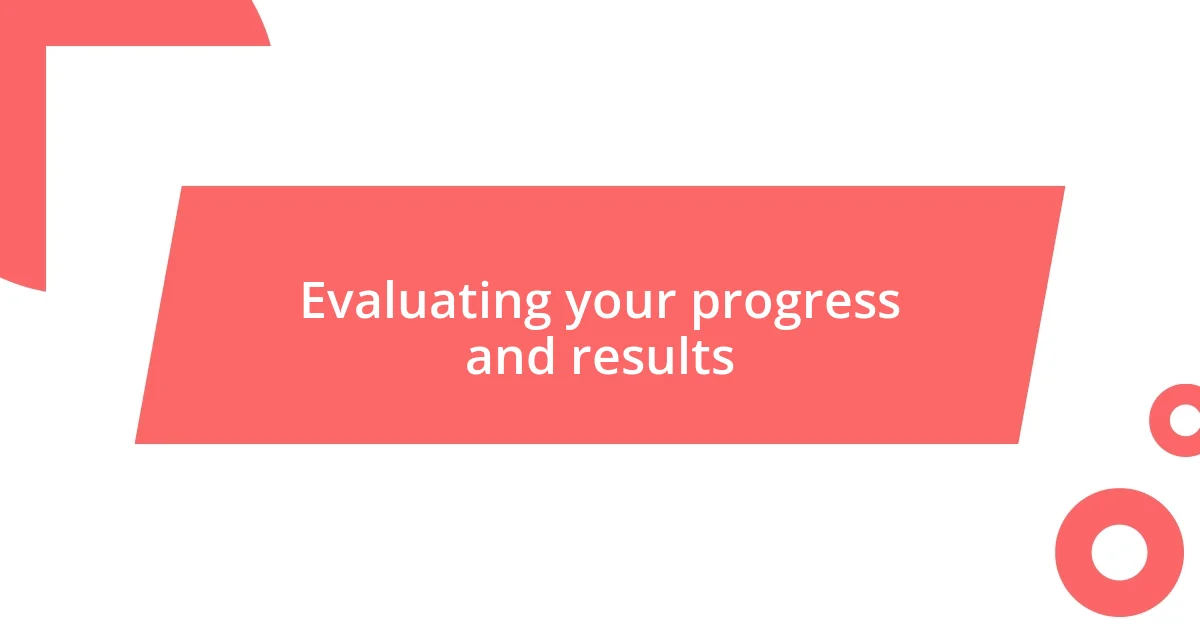
Evaluating your progress and results
Evaluating your progress with emotional memory techniques can be an enlightening experience. I often keep a journal where I document my feelings and experiences related to the memory techniques I’ve tried. This way, I can look back and see how these emotional connections have evolved over time. Have you ever considered tracking your emotional growth as a key part of your learning journey?
I also find that comparing my recall abilities before and after applying these techniques reveals clear patterns. For example, I once noticed that after a month of using emotional storytelling, my ability to remember events improved significantly. It was like unlocking a new level in a game! So, how have your results changed when you’ve engaged with emotional cues in your study routines? Reflecting on this can be a powerful motivator.
Another practical approach is to share my progress with friends or study groups. When I talk about my experiences, I often realize how much I’ve gained through the use of emotional memory techniques. It’s fascinating to hear others’ insights, too, and it often inspires me to try new strategies. Have you found that discussing your techniques with others enhances your own understanding? It certainly deepens my appreciation for the power of shared learning in shaping our memory journey.








